Related Research Articles

Poul William Anderson was an American fantasy and science fiction author who was active from the 1940s until his death in 2001. Anderson also wrote historical novels. He won the Hugo Award seven times and the Nebula Award three times, and was nominated many more times for each award.

Damon Francis Knight was an American science fiction author, editor, and critic. He is the author of "To Serve Man", a 1950 short story adapted for The Twilight Zone. He was married to fellow writer Kate Wilhelm.

Robert Shaw was a science fiction writer and fan from Northern Ireland, noted for his originality and wit. He won the Hugo Award for Best Fan Writer in 1979 and 1980. His short story "Light of Other Days" was a Hugo Award nominee in 1967, as was his novel The Ragged Astronauts in 1987.
This article contains information about the literary events and publications of 1931.
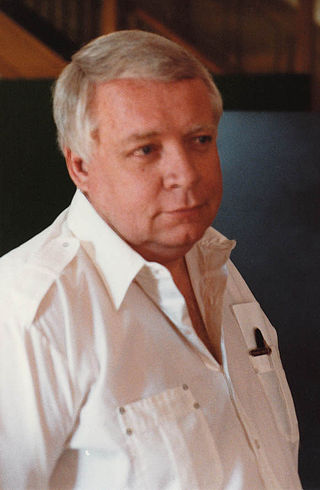
Algirdas Jonas "Algis" Budrys was a Lithuanian-American science fiction author, editor, and critic. He was also known under the pen names Frank Mason, Alger Rome in collaboration with Jerome Bixby, John A. Sentry, William Scarff, and Paul Janvier. In 1960, he authored Rogue Moon, a novel.
Lester del Rey was an American science fiction author and editor. He was the author of many books in the juvenile Winston Science Fiction series, and the editor at Del Rey Books, the fantasy and science fiction imprint of Ballantine Books, along with his fourth wife Judy-Lynn del Rey.

Drexel Jerome Lewis Bixby was an American short story writer and scriptwriter. He wrote the 1953 story "It's a Good Life", which was included in The Science Fiction Hall of Fame. It formed the basis of a 1961 episode of The Twilight Zone and was remade in Twilight Zone: The Movie (1983). He wrote four episodes for the Star Trek series: "Mirror, Mirror", "Day of the Dove", "Requiem for Methuselah", and "By Any Other Name". With Otto Klement, he co-wrote the story upon which the science fiction movie Fantastic Voyage (1966), the related television series, and the related Isaac Asimov novel were based. Bixby's final produced or published work so far was the screenplay for the 2007 science fiction film The Man from Earth.

Time and Stars is a collection of science fiction short stories by American writer Poul Anderson, published in 1964.
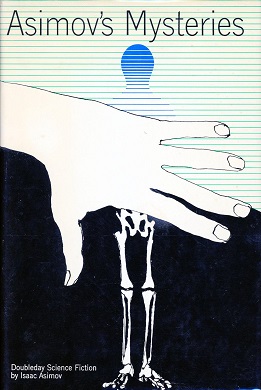
Asimov's Mysteries, published in 1968, is a collection of 14 short stories by American writer Isaac Asimov, almost all of them science fiction mysteries. The stories were all originally published in magazines between 1954 and 1967, except for "Marooned off Vesta", Asimov's first published story, which first appeared in 1939.

Science fiction is an important genre of modern Japanese literature that has strongly influenced aspects of contemporary Japanese pop culture, including anime, manga, video games, tokusatsu, and cinema.

The Squares of the City is a science fiction novel by British writer John Brunner, first published in 1965 (ISBN 0-345-27739-2). It was nominated for the Hugo Award for Best Novel in 1966.

Infinity Science Fiction was an American science fiction magazine, edited by Larry T. Shaw, and published by Royal Publications. The first issue, which appeared in November 1955, included Arthur C. Clarke's "The Star", a story about a planet destroyed by a nova that turns out to have been the Star of Bethlehem; it won the Hugo Award for that year. Shaw obtained stories from some of the leading writers of the day, including Brian Aldiss, Isaac Asimov, and Robert Sheckley, but the material was of variable quality. In 1958 Irwin Stein, the owner of Royal Publications, decided to shut down Infinity; the last issue was dated November 1958.
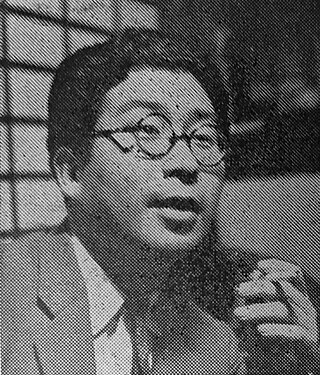
Sakyo Komatsu was a Japanese science fiction writer and screenwriter. He was one of the most well known and highly regarded science fiction writers in Japan.
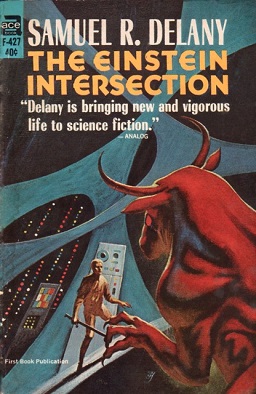
The Einstein Intersection is a 1967 science fiction novel by Samuel R. Delany. The title is a reference to Einstein's Theory of Relativity connecting to Kurt Gödel's Constructible universe, which is an analogy to science meeting philosophy. The original publisher, Ace Books, changed Delany's originally intended title from A Fabulous, Formless Darkness for commercial reasons.

Hoka! is a collection of science fiction stories by American writers Poul Anderson and Gordon Dickson, a sequel to Earthman's Burden. It was first published by Wallaby in 1983. The stories originally appeared in the magazines Fantasy and Science Fiction and Analog Science Fiction and Fact.

Tomorrow Speculative Fiction was a science fiction magazine edited by Algis Budrys, published in print and online in the United States from 1992 to 1999. It was launched by Pulphouse Publishing as part of its attempt to move away from book publishing to magazines, but cash flow problems led Budrys to buy the magazine after the first issue and publish it himself. There were 24 issues as a print magazine from 1993 to 1997, mostly on a bimonthly schedule. The magazine was losing money, and in 1997 Budrys moved to online publishing, rebranding the magazine as tomorrowsf. Readership grew while the magazine was free to read on the web, but plummeted when Budrys began charging for subscriptions. In 1998 Budrys stopped acquiring new fiction, only publishing reprints of his own stories, and in 1999 he shut the magazine down.
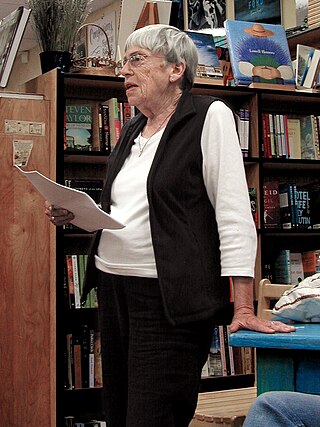
Soft science fiction, or soft SF, is a category of science fiction with two different definitions, defined in contrast to hard science fiction. It can refer to science fiction that explores the "soft" sciences, as opposed to hard science fiction, which explores the "hard" sciences. It can also refer to science fiction which prioritizes human emotions over the scientific accuracy or plausibility of hard science fiction.
The year 1935 was marked, in science fiction, by the following events.

Nebula Award Stories Two is an anthology of science fiction short stories edited by Brian W. Aldiss and Harry Harrison. It was first published in hardcover by Doubleday in September 1967, with a Science Fiction Book Club edition following in November 1969. The first British edition was published by Gollancz in 1967, under the variant title Nebula Award Stories 1967. Paperback editions followed from Pocket Books in the U.S. in September 1968, and Panther in the U.K. in 1970. The Panther edition bore the variant title Nebula Award Stories 2. The book was more recently reissued by Stealth Press in hardcover in September 2001. It has also been published in German.
"Nobody Bothers Gus" is a 1955 science fiction short story by Algis Budrys. It was first published in Astounding Science-Fiction.
References
- ↑ Holland, Steve (11 September 2008). "Obituary: Algis Budrys". the Guardian. Retrieved 24 May 2018.
- ↑ "Sakyo Komatsu | Japanese author". Encyclopedia Britannica. Retrieved 9 April 2019.
- ↑ "OBITUARY : Bob Shaw" . The Independent. 17 February 1996. Archived from the original on 2022-05-01. Retrieved 24 May 2018.
- ↑ Fischer, William B. (1984). The Empire Strikes Out: Kurd Lasswitz, Hans Dominik, and the Development of German Science Fiction. Popular Press. p. 324. ISBN 9780879722586.
- ↑ "Frankenstein | film by Whale [1931]". Encyclopedia Britannica. Retrieved 9 April 2019.
- ↑ Labuza, Peter (2014). Approaching the End: Imagining Apocalypse in American Film. BookBaby. p. 7. ISBN 9781941629017.
- ↑ Lupack, Barbara Tepa; Lupack, Alan (2008). Illustrating Camelot. Boydell & Brewer Ltd. p. 59. ISBN 9781843841838.